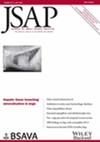Factors associated with the development of gastrointestinal adverse events in dogs with multicentric lymphoma treated with CHOP or CEOP-based protocols: a multi-institutional, retrospective study
Abstract
Objectives
Canine multicentric lymphoma is treated with multidrug protocols that include an anthracycline, namely doxorubicin, epirubicin or mitoxantrone. Both epirubicin and doxorubicin are known to cause gastrointestinal adverse events; however, very few reports have focused on comparing adverse events of the two drugs. The aim of this study was to analyse the frequency and severity of gastrointestinal adverse events in dogs with a diagnosis of lymphoma treated with a multi-agent protocol including either doxorubicin or epirubicin.
Materials and Methods
The medical databases of four institutions were retrospectively searched for dogs with a confirmed diagnosis of lymphoma that had received a CHOP or a CEOP protocol. Analysed variables included breed, sex, age, body weight, clinical stage, substage, immunophenotype, use of prednisolone, initial dose of anthracycline and remission status following the first administration of anthracycline. Dogs with detected gastrointestinal involvement, suspected gastrointestinal lymphoma or that did not undergo abdominal imaging at presentation were excluded.
Results
A total of 178 dogs were included, 114 dogs (64.1%) received epirubicin and 64 (35.9%) received doxorubicin. Forty-six dogs (40.3%) developed gastrointestinal adverse events in the epirubicin group, and 36 (56.2%) developed gastrointestinal adverse events in the doxorubicin group. Male neutered dogs, dogs younger than 10 to 15 years of age, receiving epirubicin at a dosage of 1 mg/kg and with stage V disease, were at higher risk of developing gastrointestinal adverse events.
Clinical Significance
These results could potentially be of help in preventing adverse events, although further prospective studies would be necessary to determine which is the anthracycline of choice related to a lesser proportion of gastrointestinal adverse events.


 求助内容:
求助内容: 应助结果提醒方式:
应助结果提醒方式:


